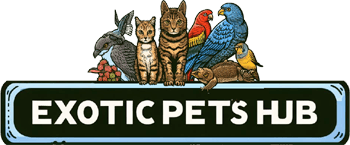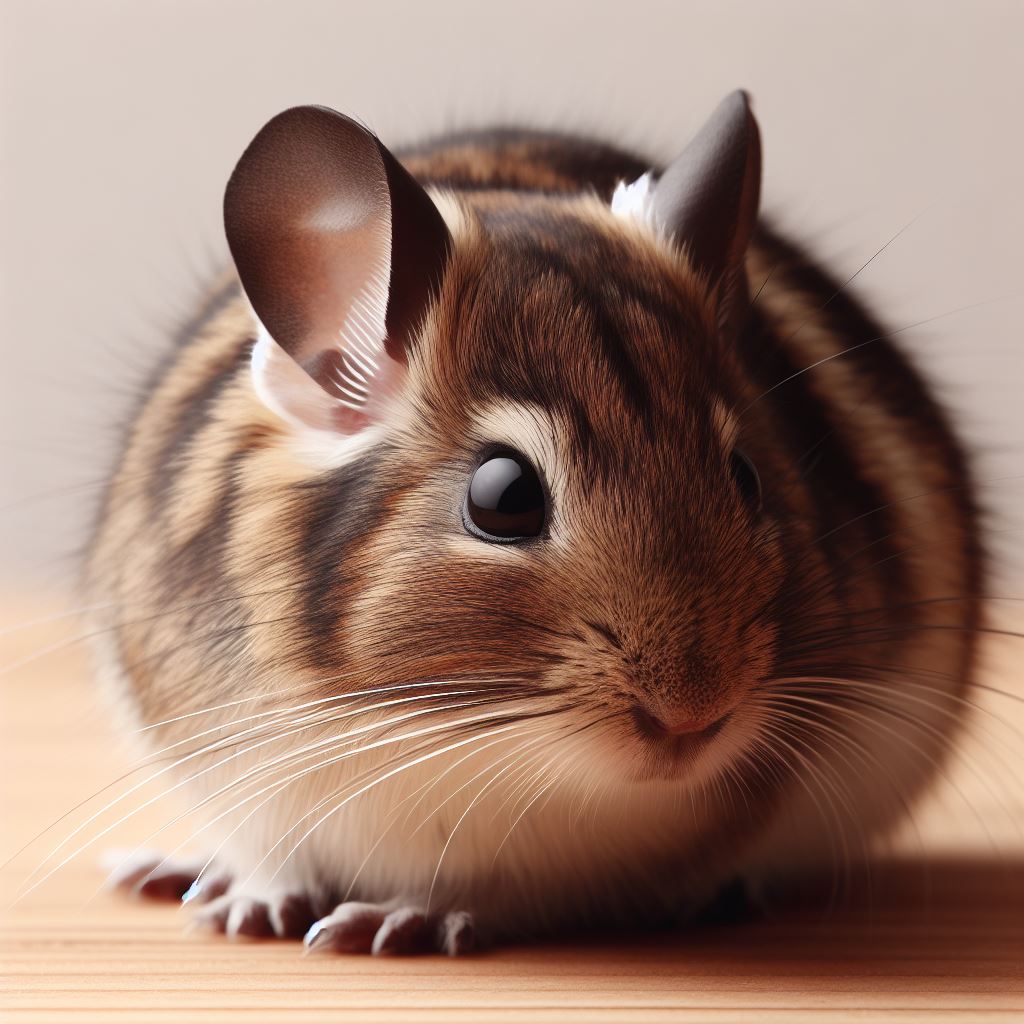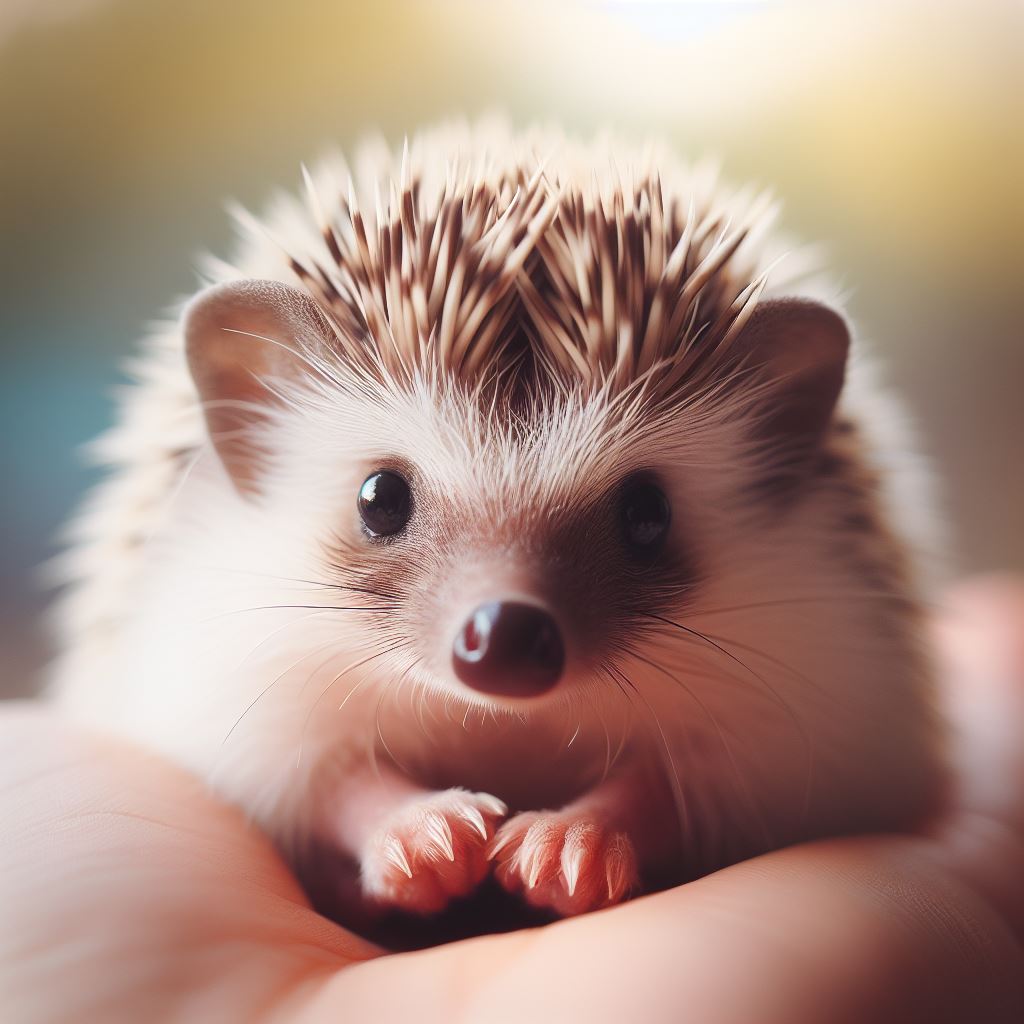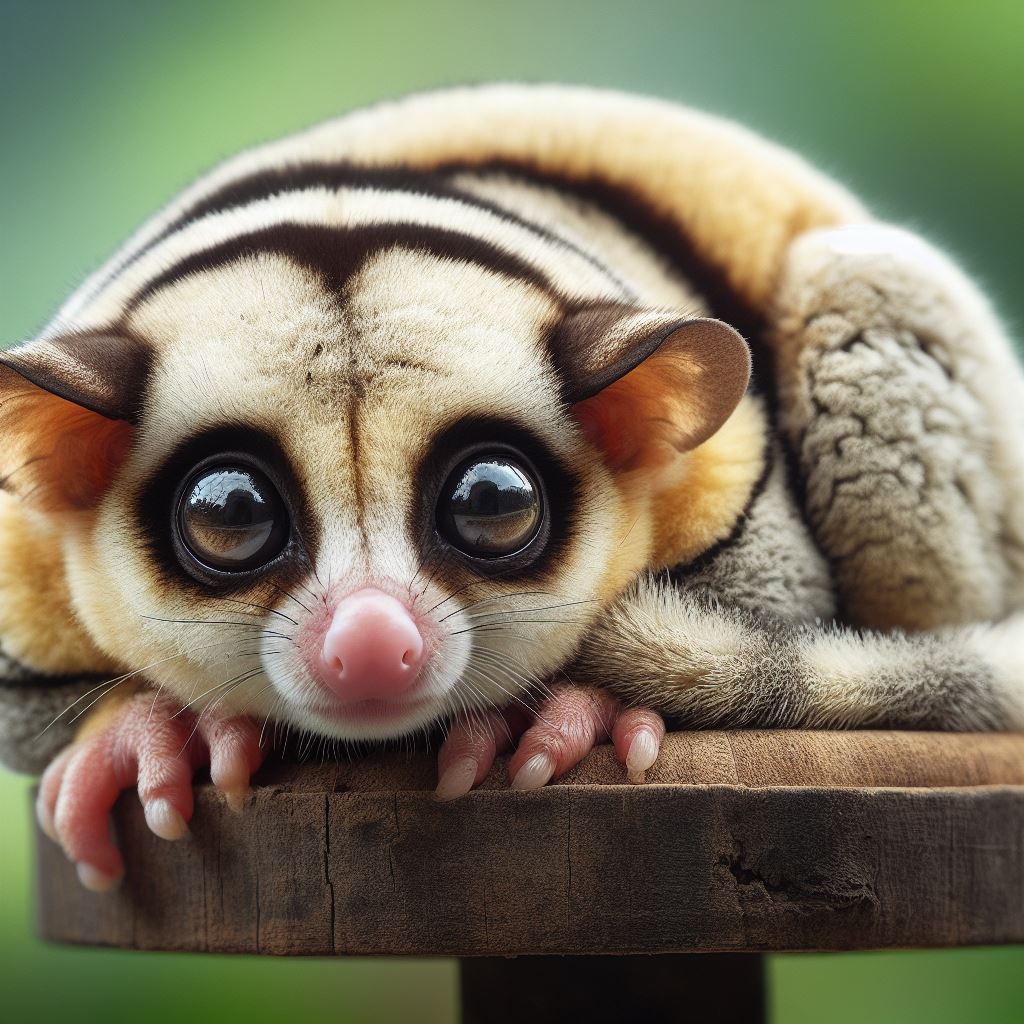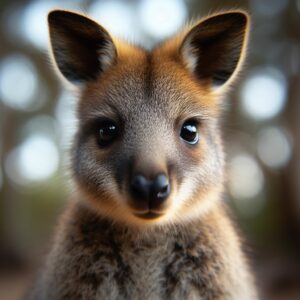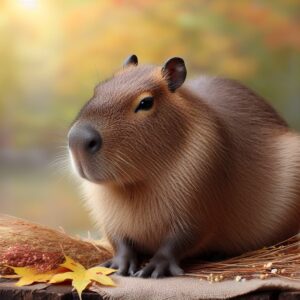Degus, charming little rodents native to Chile, have captured the hearts of exotic pet enthusiasts worldwide. Resembling a cross between a gerbil and a squirrel, these social creatures boast a bushy tail and endearing curiosity.
Originating in the sun-kissed lands of Chile, degus have a rich history as desert-dwellers. Their natural habitat has shaped their adaptable nature, making them intriguing companions for those seeking unique pets.
Degus belongs to the Octodontidae family, which includes various rodents native to South America. They are most closely related to the guinea pig and the chinchilla.
- Size: Adult degus typically measure between 9 to 10 inches (22 to 25 centimeters) in length, with their tails adding another 4 to 6 inches (10 to 15 centimeters) to their total length.
- Weight: Degus usually weigh between 6 to 10 ounces (170 to 300 grams), with males being slightly larger than females.
- Lifespan: In captivity, degus have an average lifespan of around 6 to 8 years, although some individuals can live up to 10 years or more with proper care.
Why Choose Degus as Pets?
Choosing a degu as a pet means inviting boundless energy, intelligence, and affection into your life. Their playful antics and social behavior make them perfect for families, and their low-maintenance lifestyle suits busy individuals.
Social Nature of Degus
Degus thrives in the company of their kind. They form tight-knit groups, displaying remarkable cooperation and communication, making them one of the most social rodent species.
Communication and Vocalizations
Degus communicates through an array of chirps, squeaks, and body language. Understanding their vocalizations is key to deciphering their moods and needs, and enhancing your bond with them.
Playful Activities and Enrichment
Providing degus with enrichment activities like tunnels, climbing structures, and chew toys taps into their natural curiosity. Mental stimulation and physical activity are essential for their well-being, ensuring a happy and contented pet.
Selecting the Right Degu
Choosing Healthy Degus
When selecting your degus, opt for those with bright eyes, clean fur, and active behavior. A healthy degu is alert, curious, and exhibits a glossy coat, indicative of their overall well-being.
Single Degu vs. Pairs/Groups
While solo degus can thrive with ample human interaction, pairing or grouping them is ideal for fulfilling their social needs. Pairs or small groups prevent loneliness, encouraging natural behaviors and socialization.
Age Considerations
Whether adopting a baby degu or a mature companion, age considerations are vital. Young degus are impressionable, while older ones might require more patience when adapting to their new home.
Setting Up the Perfect Degu Habitat
Choosing an Appropriate Cage
Select a spacious, well-ventilated cage with horizontal bars to accommodate their love for climbing and exploring. Ensure the bars are narrow to prevent escapes and provide platforms and ramps for vertical movement.
Bedding and Substrate Options
Soft, dust-free bedding like aspen shavings or paper-based materials create a comfortable environment. Avoid pine or cedar bedding, which can harm their sensitive respiratory systems.
Creating a Stimulating Environment
Enhance their living space with chew toys, tunnels, and nesting materials. Regularly rotate toys to keep them engaged, stimulating their minds and preventing boredom-related behaviors.
Nutrition and Feeding
Degu Dietary Requirements
A balanced diet is essential for degu health. Provide high-quality degu pellets fortified with essential nutrients, ensuring a steady supply of fresh hay and clean water. Avoid sugary treats and high-calcium foods.
Fresh Fruits and Vegetables: Safe Choices
Offer a variety of fresh vegetables such as kale, carrots, and bell peppers. Occasional fruits like apples and berries are treats, but be mindful of portion sizes to prevent weight issues.
Hygiene and Grooming
Bathing and Sand Baths
Degus maintain their cleanliness through sand baths. Offer a shallow dish of chinchilla sand for them to roll and play in, promoting healthy fur and skin. Avoid water baths, as degus are naturally averse to moisture.
Nail Clipping and Dental Care
Regularly trim their nails with pet clippers to prevent overgrowth, which can be uncomfortable for them. Provide wooden chews and dental toys to keep their teeth healthy and prevent dental issues.
Cleaning the Cage: Best Practices
Maintaining a clean living environment is crucial. Spot-clean the cage daily, removing soiled bedding and uneaten food. Perform a deep clean at least once a week, disinfecting the cage and replacing all bedding and accessories.
Health and Wellness
Common Health Issues in Degus
Degus are prone to dental problems, diabetes, and obesity. Watch for signs like excessive drooling, weight loss, or changes in behavior, which might indicate health issues. Regular veterinary check-ups are vital for preventive care.
Signs of Illness: What to Look For
Be vigilant for signs of illness such as lethargy, loss of appetite, or changes in stool consistency. Immediate veterinary attention is crucial, as degus tend to hide symptoms until they are seriously ill.
Regular Vet Check-ups and Vaccinations
Find a veterinarian experienced in exotic pets, preferably one with degu expertise. Regular check-ups, vaccinations, and dental exams are essential to ensure your pet’s longevity and well-being.
Exercise and Mental Stimulation
Importance of Exercise Wheels
Degus adores exercise wheels. Providing a solid, appropriately-sized wheel helps them burn off excess energy, promoting physical health and mental well-being.
DIY Toys and Chew Items
Get creative with DIY toys, using safe materials like untreated wood and paper. Cardboard tubes and boxes make excellent tunnels, offering endless opportunities for exploration and play.
Interactive Playtime: Bonding with Your Degu
Spend quality time interacting with your degus outside their cage. Use tunnels, treats, and gentle handling to build trust and strengthen your bond. Regular play sessions enhance their social skills and overall happiness.
Training and Socialization
Positive Reinforcement Techniques
Positive reinforcement, like treats and praise, can be used to encourage desired behaviors. Be patient and consistent, rewarding them when they respond to commands or show positive social interactions.
Teaching Basic Commands
Training degus basic commands like recall can be achieved through repetition and positive reinforcement. Use their favorite treats as rewards, making the learning process enjoyable for them.
Socializing Degus with Humans and Other Pets
Gradually introduce degus to family members and other pets in a controlled environment. Supervised interactions are essential, allowing them to adjust at their own pace. Always prioritize their safety and comfort.
Breeding and Reproduction
Understanding Degu Reproductive Behavior
Breeding degus requires careful consideration and expertise. Degus reach sexual maturity early, so if you plan to breed, ensure you understand their complex social dynamics and reproductive behaviors.
Responsible Breeding Practices
Responsible breeding involves thorough research, genetic testing, and ensuring the offspring have suitable homes. Avoid overbreeding, as there are ethical responsibilities to consider regarding the welfare of both the parents and the kits.
Caring for Pregnant and Nursing Degu Mothers
Provide pregnant and nursing mothers with a quiet, stress-free environment. Offer a nutritious diet rich in protein, and monitor their health closely. Adequate nesting materials and privacy are crucial for their well-being.
Handling and Taming Degus
Building Trust with Your Degus
Building trust takes time and patience. Spend time near their cage, allowing them to get used to your presence. Offer treats and speak gently to them, encouraging them to associate you with positive experiences.
Proper Handling Techniques
When handling degus, approach them calmly and confidently. Scoop them up gently, supporting their body, and avoid sudden movements. Always be mindful of their fragile tails and handle them with care to prevent injuries.
Taming Timid or Skittish Degus
Timid degus requires extra patience. Spend quiet, calm moments with them, avoiding sudden movements. Offer treats from your hand, allowing them to approach you willingly. It might take time, but consistency will eventually win their trust.
Traveling with Degus
Travel Cages and Safety Measures
Invest in a secure travel cage that provides proper ventilation and safety during journeys. Line the cage with familiar bedding, and secure water and food containers. Minimize sudden stops and sharp turns to reduce stress.
Minimizing Stress during Travel
Traveling can be stressful for degus. Keep noise levels low, and place the cage in a stable position within the vehicle. Covering the cage partially can provide a sense of security, reducing their anxiety during the journey.
Preparing for Temporary Housing
When traveling, prepare a temporary setup resembling their home cage. Familiarity will comfort them. Bring their favorite toys and bedding, ensuring they have a cozy corner to retreat to in the new environment.
Degus and Other Pets
Introducing Degus to Other Animals
Introduce degus to other pets gradually and under supervision. Allow them to observe each other from a distance, gauging their reactions. Positive interactions can lead to friendships but always prioritize safety.
Supervised Interactions
Supervised interactions are crucial during introductions. Monitor body language and behavior closely. If any signs of stress or aggression occur, separate the animals immediately. Slow, controlled introductions yield the best results.
Potential Issues and Solutions
Potential issues, such as territorial disputes, can arise. Provide separate living spaces if needed and allow time for adjustment. Professional guidance from a veterinarian or animal behaviorist can be invaluable in resolving complex issues.
Degus in Different Life Stages
Caring for Baby Degus (Kits)
Baby degus, or kits, are incredibly delicate. Provide a warm, quiet environment with a shallow dish of water and easy access to nutritious food. Handling should be minimal initially to reduce stress.
Adolescence: Special Considerations
During adolescence, degus experiences hormonal changes. Be patient with behavioral shifts, which are natural during this period. Offer extra mental and physical stimulation to channel their energy positively.
Degus in Their Senior Years: Elderly Care
As degus age, they may become less active and require special care. Provide softer bedding, easily accessible food and water, and regular veterinary check-ups to monitor their health. Gentle interaction and affection can greatly enhance their quality of life.
Recognizing and Responding to Behavioral Issues
Aggression and Dominance
Aggression can occur, especially in groups. Monitor interactions closely and provide plenty of space and resources to minimize conflicts. Separation might be necessary if aggression persists.
Chewing and Destructive Behavior
Chewing is a natural behavior, but it can become destructive. Offer appropriate chew toys to redirect their chewing instincts. If they target specific items, like cage bars, consider changing their environment or providing more stimulation.
Excessive Vocalizations: Understanding the Reasons
Degus can be vocal, especially when communicating or seeking attention. Excessive vocalizations might indicate stress or health issues. If their behavior changes suddenly, consult a vet to rule out underlying problems.
Legal Considerations and Regulations
Local Laws Regarding Degu Ownership
Research local laws regarding degu ownership. Some areas have restrictions due to concerns about them becoming invasive species. Complying with regulations ensures the safety and well-being of both the degus and the community.
Permits and Licenses
If permits or licenses are required, obtain them before getting degus. Responsible ownership includes following legal guidelines and ensuring that your pets do not pose a threat to local ecosystems.
Ethical Responsibilities as a Degu Owner
Ethical responsibilities extend beyond legality. Provide proper care, prevent overpopulation through responsible breeding practices, and contribute positively to degu communities. Your commitment ensures the welfare of these fascinating creatures.
Finding a Reputable Degu Breeder or Rescue
Researching Breeders and Rescues
Thoroughly research potential breeders or rescues. Look for clean, spacious facilities and inquire about their degu care practices. Reputable sources prioritize the health and well-being of their animals.
Questions to Ask Before Purchasing/Adopting
Ask questions about the degus’ lineage, health history, and socialization. A good breeder or rescue will be transparent, providing all the necessary information to help you make an informed decision.
Red Flags to Watch Out For
Be cautious of breeders or rescues that refuse to answer questions or provide proof of proper care. Poor living conditions, sickly animals, or reluctance to allow you to visit the facility are red flags indicating an irresponsible source.
Conclusion: Providing a Happy and Healthy Life for Your Degus
Recap of Key Points
Caring for degus involves understanding their social nature, providing a stimulating environment, and meeting their dietary and healthcare needs. Regular vet check-ups, mental stimulation, and proper socialization are keys to a fulfilling degu companionship.
The Joy of Degus Companionship
Embracing the joy of degu companionship means entering a world of endless charm and playful antics. These intelligent creatures form deep bonds with their caregivers, enriching lives with their unique personalities and lovable quirks.
Continuous Learning and Adaptation in Pet Care
Degu care, like any pet care, is a journey of continuous learning and adaptation. Stay informed about the latest research, and observe your degus closely to understand their individual needs. Adapting your care routine ensures a happy and fulfilling life for your furry friends.
Additional Resources and References
Books, Websites, and Forums
Explore reputable books, websites, and online forums dedicated to degu care. Engaging with a community of degu enthusiasts provides valuable insights and a platform to share experiences and knowledge.
Recommended Reading for Degus Owners
Invest in well-reviewed books specifically tailored to degu care. These resources offer in-depth knowledge, covering topics from behavior to health, enriching your understanding of these delightful creatures.
Veterinary References and Specialists
Establish a relationship with a vet experienced in exotic animals. They can provide expert advice, routine check-ups, and emergency care tailored to degus, ensuring your pets receive the best possible healthcare.
Frequently Asked Questions (FAQs)
Common Concerns about Degus Care
Address common concerns such as diet, behavior, and healthcare. Providing clear, concise answers eases the minds of degu owners, ensuring they can confidently meet their pets’ needs.
Expert Answers to FAQs
Offer expert advice based on extensive research and practical experience. Reliable information empowers degu owners to make informed decisions, promoting the well-being of their beloved pets.
Where to Seek Further Assistance
Encourage readers to seek further assistance from degu communities, local veterinarians, or reputable online resources. Being part of a supportive community ensures that degu owners can share their experiences and seek guidance when needed.
In conclusion, embracing the delightful world of degu companionship involves a blend of understanding their natural behaviors, meeting their physical and mental needs, and fostering a loving and trusting bond. By providing a nurturing environment and continuous care, you can ensure your degus leads happy, healthy lives, enriching your life in return.
